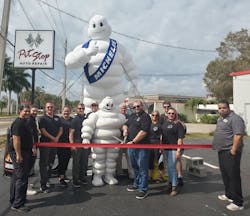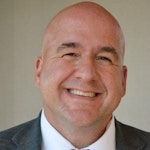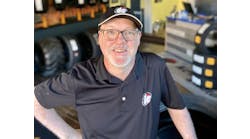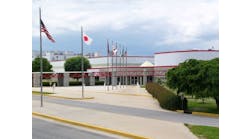In 2005, Joe Ramsay was turning wrenches at Pit Stop Auto Repair — at the time a three-store dealership headquartered in Venice, Fla.
“I was a general service technician — changing tires and changing oil,” he says. “I always teased management that I was so bad at that, they would have to put me in the office!”
Sixteen years later, Ramsay is “the office.”
As Pit Stop’s owner and president, he operates a string of seven stores, starting in the greater Sarasota, Fla., area and stretching south to Fort Myers. (An eighth Pit Stop store will open this month.)
Plans to expand into other parts of Florida — and beyond — are in the works.
“It’s been a great couple of years,” says Ramsay, age 38. “It’s been exciting. It’s been nerve-wracking at times. But overall, it’s been good.”
Crowded Market
The south Florida market is ultra-competitive, says Ramsay. “We have chains like Tire Kingdom. We have Bridgestone — both Firestone (outlets) and Tires Plus stores. Sometimes they’re almost next door to each other.
“We also have the Monro group with Tire Choice. We have Pep Boys. There are a lot of chains and it seems like there are always more” entering the area.
Pit Stop competes with other established, family-owned independents, too.
“And we have competitors who are working out of storage units, charging 1980s prices,” he says.
The general economy in southwest Florida “is booming.” Residential construction, in particular, has been robust.
“They’re building houses faster than they probably should.”
Other than construction, there’s “very little traditional industry” in the region, according to Ramsay.
“We’re a service industry market. We’re heavily reliant on tourism. We’re heavily reliant on retirees. We’re heavily reliant on snowbirds — especially at our island location and (others) that are close to the water.”
Diverse Customer Base
“An island location?” Ramsay has heard that question on more than one occasion.
Pit Stop has a store on what locals call “Venice Island,” a section of the mainland connected by bridges built across a man-made intercoastal waterway.
Another Pit Stop location is located in Venice, near the coast.
The two stores’ customers are radically different, says Ramsay.
“Our Venice stores are three quarters of a mile apart on the same road. But one is on the island on one side of the bridge and the other is on the mainland on the other side of the bridge.
“On one side, we’re working on high-end Jaguars and BMWs and on the other side, we’re working on rusted-out pickup trucks,” he explains.
“You would be surprised at how people on the island don’t want to deal with the mainland people and people on the mainland who say, ‘I just don’t have enough money to buy tires on the island.’”
Other Pit Stop locations are “out by the water,” too, says Ramsay.
“Our Fort Myers store is only three blocks from the water. Those (stores) are the most seasonal.”
Ramsay admits that finding affordable real estate in growing areas is “tough” at the moment.
“I bought a piece of property on Venice Island right next to our store so I could expand the parking lot. And what I paid for that property, I could have bought an entire store — with parking and everything — in Fort Myers.”
Poised to Grow
Personnel and capital present additional challenges, according to Ramsay.
“We have people who are really phenomenal. Some have been with us for 20-plus years — longer than I have.”
But staffing new stores “can be tricky,” he notes.
“When a store seems to run itself, you say, ‘Well, that’s a given.’ But with a new store, it’s not.”
Finding qualified candidates has become tougher, which has forced Ramsay to adjust the compensation packages that he offers.
But wages and benefits aren’t the only factors workers consider, he says. A good, supportive culture is equally vital.
“We have two core values -— give and grow. And that’s our attitude toward our people. We want to be a company that’s generous. We also want to see our people grow on a personal level.
“One of my goals is to get to the point where we’ve become a company that people want to work for.”
Ramsay encourages employees to give back to their communities during off-work hours.
“We have ‘volunteer time,’ where we pay employees to take a week off and volunteer at a non-profit. We also match gifts (donated to) any non-profit.”
“I want Pit Stop to be listed on the side of companies that people are lining up to work for — to where we’re turning candidates away.”
Capital is an entirely different nut to crack, according to Ramsay.
To date, Pit Stop’s expansion has been funded by profit that he has plowed back into the operation, as well as a few Small Business Administration loans.
“As we look at our financial models, there is a point where there will only be so much we can do before we restock the war chest.
“To take that next big step to put us on a more regional level, we’re going to need a large capital investment of some sort — whether it’s loans or investors or partners. It’s something we’re certainly cognizant of.”
Ramsay has been eyeing acquisitions “to the north of us and on the east coast. We’re looking to add several more stores across a more geographically spread-out area.”
He also is looking beyond “The Sunshine State.”
“The next step is the southeastern U.S.,” he says.
‘The Measuring Point’
In the meantime, Ramsay has been methodically developing Pit Stop’s back-office infrastructure.
“One of my philosophies has always been to build it stronger than it needs to be — even though my finance director doesn’t like it sometimes!”
The idea is to place the right talent in the right positions “so there will never be a structural problem that holds us back.”
This forethought also applies to Pit Stop store managers.
“Before we started our latest round of growth — going back to July 2019 — I hired all of my managers for all of my next stores,” he says.
“It’s really been a blessing as we’ve gone forward because I now have managers going into brand new stores who have been with me for more than two years.
“I’ve had two years to kind of indoctrinate them into the ‘Pit Stop way’ before they ever hit the ground inside a new store,” he says. “I felt that was really important. There’s only been a handful of people we’ve brought in who haven’t caught the vision and jumped in with both feet.”
Those individuals tend to rotate out of the system on their own, he says.
The ultimate “measuring point” for Pit Stop is how well store managers treat customers, according to Ramsay.
“That’s easy to do with one store, two stores or three stores. With seven stores, we’re doing pretty well.
“But when it gets to the point where I can no longer influence the culture of the guy at the front counter who’s interacting with our customers, that’s when growth kind of needs to stop.”
Rapid Rise: How Joe Ramsay Came to Lead Pit Stop
Joe Ramsay had worked for several other auto repair facilities before joining Pit Stop Auto Repair in 2005.
After six months as a general service technician, he moved into an office role.
By 2011, after earning an MBA, Ramsay became the manager of the dealership’s largest location in Venice Island, Fla. In 2017, he took the reins of Pit Stop’s Sarasota, Fla., store.
“It was our first expansion in 20 years and the owner, Ron Perry, said, ‘Go up to Sarasota and see what you can do.’ I poured my heart and soul into that place for a good year-and-a-half.
“Almost two years later, I went back and bought the original three stores” from Perry.
“And that’s what I really wanted — the whole company.”
From there, Pit Stop’s growth “catapulted,” says Ramsay.
“We took those three stores and my store and now we’re at seven stores. And we’re confident we can keep growing.”
Good Works Are Part of the ‘Pit Stop Way’
Pit Stop Auto Repair offers all the usual tools and programs to keep employees excited about their work.
“We push training,” says Joe Ramsay, the dealership’s owner. “We take advantage of just about every training opportunity we can. We help techs pay for their tools.
“We try to look at what the everyday sticking points are for our people and we try to get ahead of them.”
Ramsay has discovered that another effective way to build enthusiasm is to “connect our employees’ passions and what they enjoy outside of their work with their work.”
Pit Stop’s employees are civic-minded, which matches the company’s philosophy, he says.
The dealership intends to donate a million dollars to various charities and causes this year.
“We partner with a lot of non-profits,” says Ramsay. “One is a crisis pregnancy center in Venice. Fla.”
Pit Stop has hired several fathers of expecting mothers.
“One of the things that worries them — in terms of having a new baby — is how they are going to support it. Well, now they have a stable income. They’ve learned a skill or a trade. And now they can support their families.”
The seven-location dealership also partners with The Salvation Army. “We split the bill on some things.”
And Pit Stop fixes needy peoples’ cars at no cost. “Sometimes it’s just a family who has come into one of our stores with a car that’s in bad shape. We say, ‘This one’s on us.’”
Ramsay is quick to point out that his dealership’s vendors are enthusiastic contributors to the Pit Stop Charitable Foundation, which he set up in December 2020.
“We don’t just want to help somebody once and wish them the best,” he says. “We want to see their families grow and succeed.”
When Ramsay gets together with his store managers, “we always talk about those things ahead of our sales and other financial measurements. That’s one way we keep our focus where we think it should be.”




